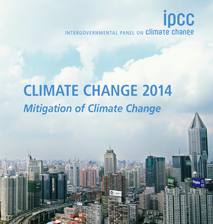It is probably not what he is doing right now, but Australian Prime Minister Tony Abbott should be wondering exactly how long it is that he can continue with his climate change policy charade.
On Sunday, the UN body, the Intergovernmental Panel on Climate Change (IPCC), delivered the third of its landmark updates on the climate science, impacts and mitigation options.
 The chief message of Working Group III, the mitigation of climate change, was one of hope – the world still had time to avoid the worst impacts of climate change, and although this would require a dramatic and urgent decarbonisation of the world’s energy and transport systems, it needn’t actually cost that much.
The chief message of Working Group III, the mitigation of climate change, was one of hope – the world still had time to avoid the worst impacts of climate change, and although this would require a dramatic and urgent decarbonisation of the world’s energy and transport systems, it needn’t actually cost that much.
Indeed, as the graph at the end of this story shows, the combined impact of all the measures that would be needed to encourage renewable energy in particular, and a suite of other technologies, might subtract just 0.06 per cent from annual global growth.
And that is without calculating the obvious benefits or reduced air pollution and enhanced energy security, and without the obvious devastating impacts on the economy if climate change is allowed to continue unchecked.
In Australia, the IPCC reports have gone largely unremarked or cherry picked by much of the mainstream media. After the report from Working Group II last month, The Australian reprinted an article from the Wall Street Journal highlighting how global warming might mean fewer deaths from cold. This morning its headline screamed that action to mitigate climate change would cost 10 per cent of GDP. The Australian Financial Review and the Daily Telegraph completely ignored it in their print editions. Apparently, their editors believe it is neither a business issue nor one that would trouble the general public.
This media approach has created an insular and distorted view in Australia of what is happening around the world. But any chance that world governments might sweep this under the carpet, as the Abbott government has been allowed to do by the mainstream media, were swiftly torched by the US.
Within minutes of the formal release of the IPCC report, US Secretary of State John Kerry issued a statement saying the report was a “wake-up call” about the global economic opportunity that the world could seize.
Kerry said abatement technologies can cut carbon pollution while growing economic opportunity at the same time. “The global energy market represents a $6 trillion opportunity, with 6 billion users around the world. By 2035, investment in the energy sector is expected to reach nearly $17 trillion.”
“We already know that climate science is unambiguous and that every year the world defers action, the costs only grow. But focusing only on grim realities misses promising realities staring us right in the face.
“This report makes very clear we face an issue of global willpower, not capacity.”
As if to prove Keerry’s point, the Australian government’s response was to announce that it would wait to see what action others take: Despite the protestations of its environment minister Greg Hunt, it has no will-power to address the science, and is currently intent on dismantling its capacity and the mechanisms that would allow it to do so. Just what it proposes to put in its place to respond to the science has never been articulated, apart from a unspoken concession that it could not possibly be Direct Action as currently envisaged.
Consider what Abbott has done in the seven short months since elected prime minister. He has sought to remove or castrate every instrument that could help deliver the cheapest abatement and facilitate the profound changes that are required – the carbon price, the renewable energy target, the Clean Energy Finance Corporation and the Australian Renewable Energy Agency.
And Abbott has sought to dismantle any organization that might inform him that this is a really dumb idea and an act of economic and environmental vandalism – the Climate Change Authority and the Climate Commission – and slashed the numbers of those who may do so “internally – the environment ministry and the CSIRO.
Given the contents of the IPCC report, the huge amount of research that has contributed to them, and the acceptance of these findings by virtually all the world’s governments, the Abbott government policies are being seen increasingly for what they are – policies that could only be introduced by a government that does not accept the science, or is so hopelessly blinded by short term politicking.
It is no accident that Abbott has chosen climate change science denier Maurice Newman to be his chief business advisor, and another climate change denier and nuclear advocate Dick Warburton to head the review of the renewable energy target. Even the head of his banking review, David Murray, has questioned the science. Abbott’s inner core is infested with advisors from the arch-conservative Institute of Public Affairs and other hard-right affiliates, who hold a similar contempt for the science.
The Abbott team, however, is not the only institution blithely ignoring the obvious, and the ethical. The fossil fuel industry continues to frame its forecasts, business strategy and investment decisions on the premise that nothing can, or will, change. This is happening across the world, but the Abbott government is unique in that it is the only government in the developed world – apart from perhaps Canada – that has so obviously kow-towed to the ministrations of Big Coal and Big Oil.
This graph below shows what the fossil fuel industry is concerned about. The IPCC says the decarbonisation of the world’s energy system will require a significant increase in renewable energy sources, and in energy efficiency, and a dramatic reduction in annual spending on fossil fuel extraction and burning. Remember, the fossil fuel industry spent more than $600 billion last year just looking for new deposits.
The IPCC report makes clear, however, that action must be taken urgently. There is, perhaps, only a 15-year window for meeting the 2C target affordably. And to do so, would not sacrifice living standards – for either the developed world or emerging economies.
“It is actually affordable to do it and people are not going to have to sacrifice their aspirations about improved standards of living,” Professor Jim Skea, an energy expert at Imperial College London and co-chair of the IPCC report team, told The Guardian. “It is not a hair-shirt change of lifestyle at all that is being envisaged and there is space for poorer countries to develop too.”
Another of the three co-chairs, Ottmar Edenhofer, said it was clear that business as usual – the base case that governs the investment decisions of most of the large oil, gas and coal companies in the world – is no longer tenable.
“Emissions are increasing, and the highest growth has come in the last decade, despite the global financial crisis, and we do not see that business as usual has changed,” Edenhofer said. “We have to deviate from the business as usual pathway. We cannot expect fossil fuel markets will solve problems because of the scarcity of fossil fuels.
The IPCC report canvasses a range of possible solutions, but a major scaling up of renewable energy and a focus on energy efficiency – the two policies threatened by the protestations of the incumbent industries in Australia – lie at the core of all scenarios.
“Renewable energy sources are very, very important,” Edenhofer said. “Without renewable energy, we cannot meet those targets. A large scale and rapid transformation is needed. Developed countries will be called on to advance that transformation and to meet it quickly.”
Frank Jotzo, lead author on ethics and economics and of the report’s technical summary, said that the IPCC report connected “quite closely” with the recent findings by the CCA, which were ignored by the Abbott government.
Essentially, this means that for Australia, deep cuts in Australian emissions are needed as early as 2030 – possibly a reduction as much as 50 per cent (that compares to the current target of minus five per cent).
And much of this would need to happen in the energy sector, where the greatest opportunity for low cost abatement lies. Ironically, studies from the likes of Reputex and IES and others have suggested that Australian coal output and energy emissions are likely to rise under the new policy regime. A new study from Schneider Electric suggests that without the renewable energy target, electricity costs are likely to rise because of a greater dependence on expensive gas.
Jotzo noted, however, that it was not just the domestic policies that would affect Australia. “There are many things coming Australia’s way from policy settings in other countries,” he said. If other countries imposed controls on coal, as is likely in China, and even India, this will have direct impact on coal industry in Australia.
And the chance of them doing so is increased not just because of a response to an IPCC report, but because such policies would enhance energy security and air pollution. In China, and other major emerging economies, they are looking at all three, and recognizing the ability of low cost energy sources such as solar PV to effect a dramatic transformation of the energy system. Unlike Australia, these countries are likely to accelerate that transformation, rather than slow it down.








